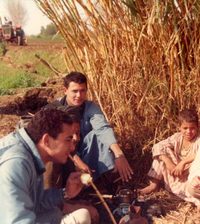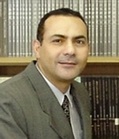A Dream Born at the Pyramids / Building a Bridge between Japan and Egypt
Click here for the Cairo University Department of Japanese and Japanese Literature Commemorative Essay on Receiving the Japan Foundation Award (1)
"Building a Bridge between Japan and Egypt--Cairo University Department of Japanese and Japanese Literature"
Walid Farouk Ibrahim
A Dream Born at the Pyramids
Dr. Saleh Adel Amin

The author (on the left) smoking a water pipe in a field in his home village of Tahway
My childhood dream was to become a diplomat. Although whenever I said I wanted to be a diplomat, my mother would insist that I should become a doctor. In Egypt, it's a source of pride, and the hope of everyone in the family, that the eldest son become a doctor. I wanted to become a diplomat because it meant that I could leave the village where I was born, and make that big leap across the Nile River that we looked at every day, to the city of Cairo on the other side. That wish finally came true during the summer vacation after my third year of middle school, when I decided on my own to run away to Cairo without telling anyone. When I got there, I worked from dawn to dusk at a bakery for a week, and managed to make a little money. In that short time, I fell under the spell of the big city, and was determined that whatever happened in the future, I would live in Cairo.
The first step toward that dream was a high school trip. We had gone to see a football match at Cairo Stadium between Egypt's two big teams, Ahly and Zamalek, and to visit the pyramids. Although it is banned now, at that time you could climb the outside of the first pyramid to the top, and I gave it a try. As I paused for a break on the side of the pyramid, exhausted, I noticed a Iwanami shinsho (pocketbook from Iwanami Shoten, Publishers) lying in front of me. I picked it up casually, and assumed from the unfamiliar characters that it was Chinese. I brought it back with me to my hometown in the countryside, and it changed my life dramatically. I was convinced now that my future lay not in diplomacy or medicine, but in studying Chinese. I wanted to do so after graduating from high school and started the application procedure for Ain Shams University, which had a Chinese Department. I also made friends with some Chinese students who were studying in Cairo. It was a big shock when one of them told me that my book was actually Japanese. I hastily switched my application to Cairo University, and managed to get accepted into the Department of Japanese and Japanese Literature, which was my first contact with Japan.
 Left: At Dandara Temple in Upper Egypt, during the author's student days
Left: At Dandara Temple in Upper Egypt, during the author's student days
Right: The author's office at Cairo University
When I started studying Japanese, I came up against the Kanji, which seemed like a monstrous barrier to me. I even thought of dropping out of the Japanese department in mid-term because I couldn't possibly remember all the characters. But my teacher at the time, Nobuyoshi Fukuhara, who had been posted to Egypt by the Japan Foundation, told me "Even a donkey can remember something if he repeats it over and over." So I gave it a shot, and by my third year had succeeded in memorizing 1,500 characters. Finally, I could read the book that I'd found at the pyramids. It turned out to be Kotoba to kokka (Language and the State) by Professor Katsuhiko Tanaka, who was one of the top professors at Hitotsubashi University at the time. I was overwhelmed by the content, and became immediately engrossed in the book, which has since become the subject of the research I'm doing today.
I think now that the fun I had as a student in the Japanese department, and the many Japanese friends I made, were my most important points of contact with Japan. When I was a student, the actress Kirin Kiki and her daughter visited the Japanese department on an assignment from TV Asahi. She invited me to a Japanese-style dinner, during which she told me I must come to visit Japan. I took the invitation literally, and when I had the chance to go to Japan, I tried to see her, but she refused to meet me. In that instant, I experienced for the first time the characteristically Japanese distinction of Honne and Tatemae (what people really feel, as opposed to what they say to be polite.) After graduating, I worked for TV Asahi, did simultaneous translation and other jobs, and saved enough money to pay my way to study in Japan. When I arrived in the country, I roamed from Hiroshima to Osaka, looking for a place where I could pursue my research on politics and language. I failed the entrance examination for Hiroshima University's Graduate School, and then, before taking the exam for Hitotsubashi University, I met with Professor Katsuhiko Tanaka, who told me that instead of studying with him, I should work with Professor Takao Suzuki, a specialist in language and culture at Keio University. "You'll never get a doctorate at Hitotsubashi," Prof. Tanaka added, but I remember arguing back that I wanted to try to take his courses. In the end, I was able to join Prof. Tanaka's seminar, and eventually received my doctorate on the topic "Egypt's linguistic nationalism and consciousness of national language: contrast with Japan." By getting my Ph.D., I did not exactly fulfill my mother's dream of having a doctor in the family, but at least I am called "Doctor" in Egypt. Whether I am at home in the countryside, or in Cairo, everyone refers to me as "Dr. Adel," following the Egyptian custom. When I think of it now, perhaps that is the mission that the pyramids bestowed on me.
 Dr. Saleh Adel Amin
Dr. Saleh Adel Amin
Graduated from Cairo University Department of Japanese in 1988, and traveled to Japan in 1990. He completed graduate studies at Hitotsubashi University's Graduate School of Social Sciences, and received his doctorate in social sciences in July 1999. He worked as Middle East correspondent for TV Asahi, was a part-time lecturer at the Foreign Service Training Institute, assistant professor at Hitotsubashi University, visiting professor at Osaka University's School of Foreign Studies, and is currently associate professor at Cairo University's Department of Japanese. He is the author of numerous books, including Egypt's Linguistic Nationalism and Consciousness of National Language: Contrast with Japan, Japan's Experimental Theater: Between Tradition and Modernization, Contemporary Theater in Japan, as well as the first direct translation into Arabic of classics such as Hojoki, and many articles on the topic of Japanese language reform.
Department of Japanese and Japanese Literature, Faculty of Arts, Cairo University
http://www.jpf.go.jp/e/about/award/index.html
The Department was established in 1974. As the first major center in the field of Japanese language and Japanese studies established in the Middle East and Africa region, the department has for many years worked to train scholars of Japan's language and culture, and to promote the spread of the Japanese language. Numerous books on Japan have been written and translated by graduates of the department, on topics ranging from literature to politics. The department continues to contribute significantly to smooth and effective understanding of Japanese culture in the Arabic speaking world, and produces many graduates who apply their outstanding Japanese language skills in activities around the globe.
In 2011, the department was awarded the Japan Foundation Award for Japanese Language.
Lecture by Karam Khalil (Head of the Department of Japanese and Japanese Literature, Cairo University)
http://www.jpf.go.jp/e/about/award/11/Lecture.html#02
"The History of Japanese-Language Education in Egypt and Achievement of Cairo University" PDF
Related Events
Back Issues
- 2019.8. 6 Unraveling the Maker…
- 2018.8.30 Japanese Photography…
- 2017.6.19 Speaking of Soseki 1…
- 2017.4.12 Singing the Twilight…
- 2016.11. 1 Poetry? In Postwar J…
- 2016.7.29 The New Generation o…
- 2016.4.14 Pondering "Revitaliz…
- 2016.1.25 The Style of East As…
- 2015.9.30 Anime as (Particular…
- 2015.9. 1 The Return of a Chin…

